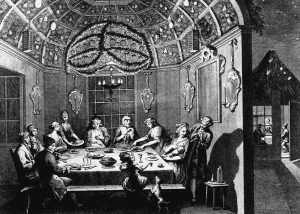The basic commandment of the ‘Feast of Sukkot’ is to sit/dwell in the Sukkah {סוכה} (tent or booth) for seven days. The Bible also speaks about the ‘Four Species’ as we discussed in yesterday’s post.
But in addition to those TWO biblical commandments, another tradition has evolved over the years and today is almost an integral part of the ‘Feast of Sukkot’ – the ‘Ushpezin.’ {אושפיזין}

The ‘Ushpezin’ are SEVEN guests who are invited to visit the ‘Sukkah’ – a different guest for each day of the holiday. However, we are not talking about ‘real’ guests but rather symbolic spiritual guests who are in fact the main and very noteworthy biblical figures: Abraham, Isaac, Jacob, Joseph, Moses, Aaron and David.
The origins of this tradition can be found in the most important text of the ‘Kabbalah’ {קבלה}(Jewish mysticism) the Book of Zohar {ספר הזוהר}, which was composed in the 13th century (in Spain).
There, every ‘Ushpiz'{אושפיז} (the singular form of ‘Ushpizin’) represents a different symbolic virtue:
1) Abraham – ‘Chesed’ {חסד} (‘grace’)
2). Isaac – ‘Yirah’ {יראה} (‘God-fearingness’)
3) Jacob – ‘Tif’eret’ {תפארת} (‘splendor’)
4) Joseph – ‘Tzadikut’ {צדיקות} (‘righteousness’)
5) Moses – ‘Anavah’ {ענווה} (‘humility’)
6) Aaron – ‘Kedushah’ {קדושה} (‘holiness’)
7) David – ‘Malchut’ {מלכות} (‘kingship’)
The unique word ‘Ushpizin’ is in fact an Aramaic word and not original Hebrew. It literally means ‘guests’ (most of the Book of Zohar is written in Aramaic). It is derived from the Latin word ‘hospes’ (‘guest’) which is the origin of the English words ‘hospital’, ‘hospitality’, ‘hospice’, ‘hostel’ and ‘hotel.’ All of these words share the concept of ‘guest’ or more accurately, taking care of guests.
